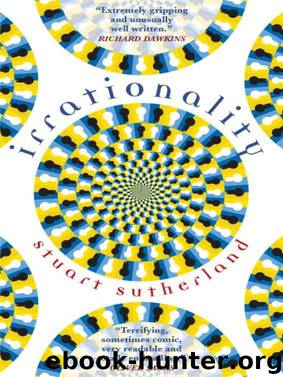Irrationality by Sutherland Stuart

Author:Sutherland, Stuart [Sutherland, Stuart]
Language: eng
Format: mobi
Tags: PSY031000
Publisher: Pinter & Martin
Published: 2010-10-10T16:00:00+00:00
1. If you are a doctor, learn some elementary probability theory.
2. If you are a patient, set your doctor a simple test on elementary probability theory.
3. In order not to foul up medical research even further, nobody without a good knowledge of statistics, probability theory and experimental design should become the editor of a medical journal, even at the expense of a vast reduction in the number of journals.
14 mistaking the cause
The same five factors that produce errors in establishing the right connections between events also produce errors in inferring causes, for the first step in discovering a cause is to detect an association between two events. In making such associations, people often falsely connect like with like (as in the case of the invalid signs for homosexuality in the Rorschach). This fallacy is prominent in reasoning about causes. Until the end of the eighteenth century, doctors were taught ‘the doctrine of signatures’, that is that the medicine taken for any ailment must, in the words of one doctor, indicate ‘by an obvious and well-marked external character the disease for which it is a remedy . . . The lungs of a fox must be a specific remedy for asthma, because that animal is remarkable for its strong powers of respiration. Turmeric has a brilliant yellow color, which indicates that it has the power of curing the jaundice . . . the polished surface and strong hardness which so eminently characterise the seeds of the Lithospermum officinale (common groundswell) were deemed a certain indication of their efficacy in calculous and gravelly disorders . . .’ J. S. Mill was the first to nail this fallacy, writing of the ‘prejudice that the conditions of a phenomenon must resemble the phenomenon’. The error is even more common in primitive cultures than in our own. As the anthropologist, Evans-Pritchard, pointed out, the Azande believe that fowl droppings cure ringworm because the two look alike and that the burnt skull of a monkey cures epilepsy because the movements of the monkey and the epileptic during an attack are not dissimilar.
These examples are derived from Nisbett and Ross, who go on to point out that the whole of psychoanalysis involves this primitive way of thinking. Fixation at the oral stage (the breast) will reveal itself in a preoccupation in adult life with the mouth – smoking, kissing and talking too much. Similarly meanness (hoarding money) is put down to the child’s wish to hoard its faeces at the anal stage and so on. The error persists today in other ways. For example, homeopathy is based on the belief that illness can be cured by administering a tiny amount of a substance that if given to a healthy person in a larger amount would produce the same illness. The extraordinary success of modern science is largely due to careful recordkeeping which prevents the ‘discovery’ of false associations and to the fact that the connections established by these records have forced scientists away from the belief that like causes like, even though many people continue to exhibit it in their everyday judgements.
Download
This site does not store any files on its server. We only index and link to content provided by other sites. Please contact the content providers to delete copyright contents if any and email us, we'll remove relevant links or contents immediately.
Rewire Your Anxious Brain by Catherine M. Pittman(18638)
Talking to Strangers by Malcolm Gladwell(13342)
The Art of Thinking Clearly by Rolf Dobelli(10443)
Mindhunter: Inside the FBI's Elite Serial Crime Unit by John E. Douglas & Mark Olshaker(9313)
Becoming Supernatural by Dr. Joe Dispenza(8196)
Change Your Questions, Change Your Life by Marilee Adams(7753)
Nudge - Improving Decisions about Health, Wealth, and Happiness by Thaler Sunstein(7689)
The Road Less Traveled by M. Scott Peck(7592)
The Lost Art of Listening by Michael P. Nichols(7487)
Mastermind: How to Think Like Sherlock Holmes by Maria Konnikova(7313)
Enlightenment Now: The Case for Reason, Science, Humanism, and Progress by Steven Pinker(7305)
Win Bigly by Scott Adams(7183)
The Way of Zen by Alan W. Watts(6594)
Daring Greatly by Brene Brown(6501)
Big Magic: Creative Living Beyond Fear by Elizabeth Gilbert(5752)
Grit by Angela Duckworth(5598)
Ego Is the Enemy by Ryan Holiday(5412)
Men In Love by Nancy Friday(5231)
The Laws of Human Nature by Robert Greene(5166)
